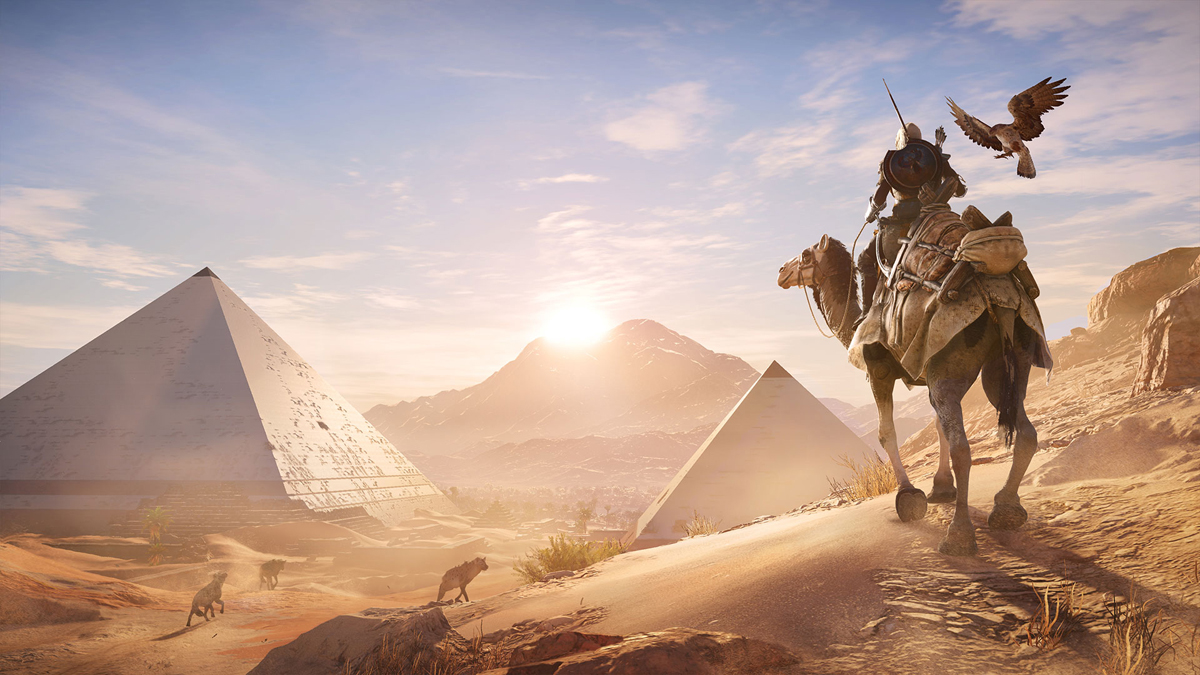Composer Sarah Schachner on bringing Ancient Egypt to life in her Assassin’s Creed Origins soundtrack
“I wanted to play up the mystery and beauty of the ancient setting but still retain a contemporary sci-fi perspective”

Want all the hottest music and gear news, reviews, deals, features and more, direct to your inbox? Sign up here.
You are now subscribed
Your newsletter sign-up was successful
Released in 2017, Assassin’s Creed Origins was warmly received by critics and players alike, with its soundtrack being singled out for particular praise. This was the work of musician and composer Sarah Schachner, who also performed much of the score herself.
As Ubisoft releases Discovery Tour by Assassin's Creed: Ancient Egypt – a non-violent version of the game that enables you to explore its Ancient Egyptian world as a ‘living museum’ - we caught up with Sarah to discuss not only her creative approach to the AC series, but also her work on Call Of Duty and how her relationship with music technology has changed over the years.
Interview conducted by Dom Reseigh-Lincoln.
You do most of your work from your personal studio. Could you walk us through some of the main hardware you used to bring AC Origins’ score to life?
“My original plan for Origins was to acquire a Yamaha CS-80, but that proved rather difficult so I ended up with a Roland Jupiter-6. This provided many of the synth sounds; from low drones, to ambient detuned bells and arpeggios.
“A recurring eerie Egyptian-esque desert drone in the soundtrack is from a reverb module I have in my Eurorack modular synth setup. Turning the feedback all the way up makes it self-oscillate at a specific frequency that I was modulating in different ways.
“Another piece of gear I used a lot is the iPad, actually. I use a cheap sampling app to resample and mangle all sorts of sounds and run them through the Strymon Big Sky reverb unit. I collect a lot of acoustic instruments as well, and performed all of the string instruments myself.”
Want all the hottest music and gear news, reviews, deals, features and more, direct to your inbox? Sign up here.
How has the software and hardware you use as a composer changed over the years, and how has this influenced how you write and record your music?
“Nothing is worse than creativity and inspiration being stifled by technical limitations. Technology has certainly improved over the last 10 years, and virtual instruments are now better than ever. 64-bit DAWs were a huge improvement, allowing me to load much larger sessions without melting my CPU or running out of RAM.
“I started out using Digital Performer and tried a few other programs which just weren’t a good fit for me, so I switched to Cubase a few years ago. The functionalities in Cubase have made my production workflow more streamlined, which has enabled me to work faster and be more creative. Everyone has different needs and priorities, so it’s just a matter of trial and error until you find a DAW that is the best fit.
“I’ve gotten more into analogue synths and Eurorack over the years, which has really broadened the way I think about sound. I used to rely heavily on sample libraries and virtual instruments during the writing process, but now I focus much more on creating unique sounds from the start with acoustic instruments I’ve collected, audio processing, the modular synth, and other outboard gear.”
Unlike Black Flag and Unity, which drew from periods with very clear musical histories, Ancient Egypt’s remains something of a mystery. Did this afford you a chance to approach its sonic landscape with a clean slate?
“Absolutely. The Ancient Egyptian culture was so intertwined with such fantastical mythology, It gave me more creative freedom with the music. I chose not to use a symphonic orchestra because it didn’t exist until about 1,700 years later and originated in western Europe. I wanted to reflect the time period by using authentic regional instruments like lutes, lyres, ouds, bells and hand drums, but juxtapose them against a hybrid-synth foundation.”

The score has a much calmer pace and feel than other entries in the series and there are flourishes that reminded us of Jesper Kyd’s early work for AC (especially your fantastic version of Ezio’s Family). Have you found any of these previous scores subtly/consciously influencing your own writing process?
“Every game in the main series since Jesper has taken place in the 18th and 19th centuries, which aren’t as mysterious to us as older eras. We know exactly what the music of those time periods sounded like, and they called for more bombastic styles. With Origins going back in time to the most ancient period of history yet, it just made sense to go with an atmospheric mood for this story and character, which happens to be more in line with how Jesper approached the Third Crusade and Renaissance periods. I wanted to play up the mystery and beauty of the ancient setting but still retain a contemporary sci-fi perspective.”
You’ve also had the chance to work with full orchestras before for video game soundtracks - what are some of the challenges involved in writing for an orchestra as opposed to your performances in-studio?
“There are definitely advantages and disadvantages that come with performing my own instruments vs using a live orchestra. Sometimes I want the sound of my own playing with an intimate non-traditional sound palette, but other times, you really just need the power of the orchestra.
“The fact that I play multiple string instruments is certainly helpful in the composing and mockup stage as it gives my music a certain level of personal character, but it is time-consuming to play so many things myself all the time.
I’ve gotten more into analogue synths and Eurorack over the years, which has really broadened the way I think about sound.
"While I do have classical training, my playing has more of a rock, folk and jazz influence, which often becomes integral to the overall sound. It’s easy for me to overdub myself a few times and get a really tight specific feel, but that can be challenging to recreate with a group of orchestral studio musicians with strict classical training who are sight reading notes on a page.
"It’s important to have a talented orchestrator and conductor who can help translate exactly what’s in the mockups to the page and communicate creatively so the players can deliver what is intended. Things are always going to sound different played live, which can be simultaneously a little scary but also really exciting. I’ve been lucky to work with great orchestrators and conductors, and that definitely helps the process go smoother.
“Also, with video game music, you generally need to heavily stripe your sessions, meaning each section records their parts individually and not all together as an ensemble. This is because you need to have stems of each instrument to create alternate versions and submixes later for different parts of the game. It can be labour-intensive and a little disconcerting, since you’re rarely hearing how it all sounds together.”
How does working on an open-world such as Assassin’s Creed Origins differ from something with a more linear feel, like your work on Call Of Duty Infinite Warfare?
“An open-world game generally needs more music than a first-person shooter with a shorter, more structured campaign. The physical world of Assassin’s Creed Origins was bigger than ever, and it needed hours and hours of material.
“In addition to the main story and general stealth/combat system, there are loads of side quests, gladiator battles, chariot races and little scenarios the player can encounter that need custom music. Each geographical region has specific music for all of these situational events, which changes depending on time of day, whether the player is free roaming on foot vs on an animal, and countless other parameters. In the beginning, it can be tough to wrap your head around the sheer amount of music that has to be written on such a massive project, and it always feels like a miracle when it somehow gets done.
“A Call of Duty campaign is shorter and more concise and the player doesn’t have as much choice over what they do when. For Infinite Warfare, aside from the story-driven cutscene music, I composed broad thematic suites of music for each story mission that covered the various levels of action and suspense.
‘Call of Duty is a bit of its own animal though because it also has the zombie and multiplayer modes which are essentially standalone games within the game. Zombie mode is usually a completely different tone and style of music, and the multiplayer segment requires a different musical approach to the single-player campaign. The multiplayer end of match faction themes are almost like writing commercial jingles in the sense that they have to be catchy, but not annoy the player when heard over and over again for a year straight.”
Discovery Tour by Assassin's Creed: Ancient Egypt is available now on PS4, Xbox One and PC as a free download for players who own Assassin's Creed Origins. It’s also available as a standalone game on PC via Uplay and Steam.
MusicRadar is the number one website for music-makers of all kinds, be they guitarists, drummers, keyboard players, DJs or producers...
- GEAR: We help musicians find the best gear with top-ranking gear round-ups and high-quality, authoritative reviews by a wide team of highly experienced experts.
- TIPS: We also provide tuition, from bite-sized tips to advanced work-outs and guidance from recognised musicians and stars.
- STARS: We talk to musicians and stars about their creative processes, and the nuts and bolts of their gear and technique. We give fans an insight into the craft of music-making that no other music website can.
